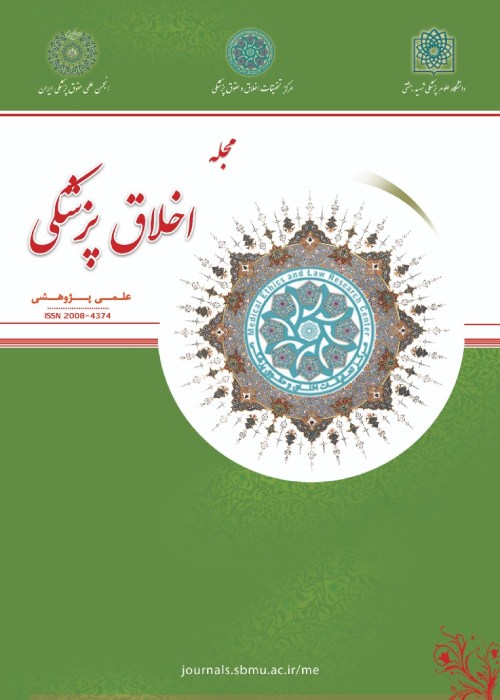The Relationship between Dynamic - Traditional Religiosity and the event of Myocardial Infarction
Author(s):
Abstract:
Background And Aim
Intercultural studies have shown the relationship between the religious beliefs and health improvement. This study, hence, aimed to determine the relationship between dyna mic - traditional religiosity and modernity, and the event of myocardial infarction.Materials And Methods
This case - control study was done on patients referring to Taleghani Hospital, affiliated to Shahid Beheshti University of Medical Sciences in 2016. Th e data collection instrument was a researcher - made questionnaire on dynamic -traditional religiosity consisting of 15 items on a 5 - item Likert scale . Census sampling was utilized and t he obtained data were analyzed using SPSS s tatistical software version 20 . EthicalConsiderations: After explaining the objectives of the study and emphasizing anonymity and confidentiality of the questionnaires, the participants verbal informed consent was obtained.
Findings: The case group consisted of 165 patients (40%) and 246 patients (60%) comprised the control group. Most participants were Persian, Shi a, in the age group of 30 - 39 years. They mostly had high school education, were employees with a monthly income of ten million Rial s or more, had physical activity and were nonsmokers. The mean of dynamic - traditional religiosity in all of the studied patients was 3.98±0.45 (0 -5). 14% percent of the participants had a medium level of religiosity (48 - 70%) and 86% of them had a desired level of religiosity (more than 70%). Ther e was, however, a significant difference between the mean of dynamic - traditional religiosity among the patients with or without physical activit y , different educatio nal levels , different inc ome levels , and different ethnicities (p
Conclusion
Although , the most of participants had a desirable level of religiosity, lack of a significant difference between two groups indicates that to reduce the incidence of this event, it is necessary that susceptible patients receive spiritual care in order to use th eir beliefs to gain the necessary abilities with the help o f trained health care providers. Hence, planning to provide spiritual care for the susceptible patients by the health care system is recommended.Keywords:
Language:
Persian
Published:
Journal of Medical Ethics, Volume:10 Issue: 37, 2016
Pages:
17 to 25
magiran.com/p1607074
دانلود و مطالعه متن این مقاله با یکی از روشهای زیر امکان پذیر است:
اشتراک شخصی
با عضویت و پرداخت آنلاین حق اشتراک یکساله به مبلغ 1,390,000ريال میتوانید 70 عنوان مطلب دانلود کنید!
اشتراک سازمانی
به کتابخانه دانشگاه یا محل کار خود پیشنهاد کنید تا اشتراک سازمانی این پایگاه را برای دسترسی نامحدود همه کاربران به متن مطالب تهیه نمایند!
توجه!
- حق عضویت دریافتی صرف حمایت از نشریات عضو و نگهداری، تکمیل و توسعه مگیران میشود.
- پرداخت حق اشتراک و دانلود مقالات اجازه بازنشر آن در سایر رسانههای چاپی و دیجیتال را به کاربر نمیدهد.
In order to view content subscription is required
Personal subscription
Subscribe magiran.com for 70 € euros via PayPal and download 70 articles during a year.
Organization subscription
Please contact us to subscribe your university or library for unlimited access!




